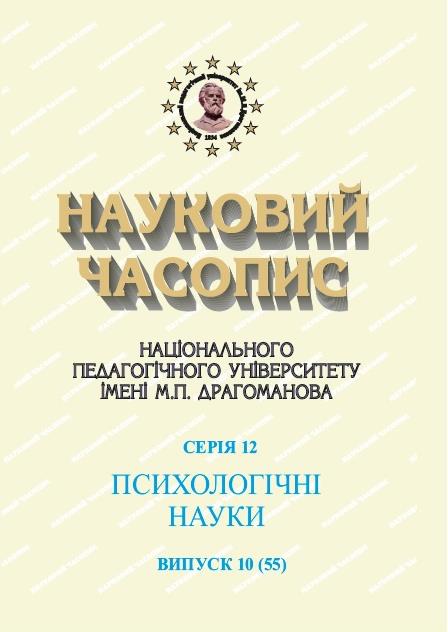RELATIONSHIP BETWEEN CULTURAL VALUE ORIENTATIONS AND NATIONAL AFFILIATION OF UKRAINIAN STUDENTS YOUTH
DOI:
https://doi.org/10.31392/NPU-nc.series12.2020.10(55).01Keywords:
cultural value orientations, hierarchy, national affiliation, city, village, higher education institutions, studentsAbstract
The strong relationship between cultural value orientations and national affiliation ensure the stability of the nation. Group identity and cultural value orientations intensively develop during the youth period. The aim of the article is to empirical study of the relationship between cultural value orientations and the national affiliation of Ukrainian students of domestic higher education institutions. To achieve this aim, the questionnaire of cultural value orientations (Schwartz Value Survey), modified method of “Ethnic affiliation” and methods of mathematical statistics was applied. The study was attended by a students of higher educational institutions of Kyiv city, who came to study from different cities and villages of the country. It was established that all students provided the greatest importance to cultural value orientations of the pole with “egalitarianism”, the smallest with “hierarchy”. It was established that the largest number of students differ in the average level of national affiliation, much less – low and lowest – high.
It was proved that the strength and direction of the relationship between cultural value orientations and national affiliation for students are different. For students who came to study from the cities, there are strong and positive relationship between the cultural value orientations of the poles “embeddedness”, “hierarchy”, “harmony”, “egalitarianism”, “mastery” and “affective autonomy” and national affiliation. For these students, the relationship between cultural value orientations of the “intellectual autonomy” pole and the national affiliation is weak. For students who came to study from the villages, the strong and direct relationship of the cultural value orientations of the poles “egalitarianism” and “embeddedness” and the national affiliation are identified. For these students, a strong and reverse relationship of cultural value orientations to the pole of “affective autonomy” with national affiliation is established. Also, the reverse relationship of cultural value orientations of the poles “intellectual autonomy”, “mastery”, “hierarchy”, and “harmony” and the national affiliation is noted to be weak. So, for students who came to study from the cities, a strong the strength the relationship between the largest number cultural value orientations and national affiliation are identified.
References
- Andrushchenko, V., & Buhlak, Yu. (2018). Osvita v konteksti dukhovnoi evoliutsii tsyvilizatsii [Education in the context of the spiritual evolution of civilization]. Interdisciplinary Studies of Complex Systems,13, 5-14. https://doi.org/10.31392/iscs.2018.13.005
- Bulakh, I.S. (2016). Psykholohiia osobystisnoho zrostannia pidlitkiv: realii ta perspektyvy : monohrafiia [Psychology of personal growth of adolescents: realities and prospects: a monograph]. Vinnytsia : TOV «Nilan-LTD».
- Jamaludin, N.L., Sam, D.L., Sandal, G.M. et al. (2016). Personal values, subjective well-being and destination-loyalty intention of international students. SpringerPlus, 5, 720. https://doi.org/10.1186/s40064-016-2439-3
- Komarova,N.V. (2006). Sposib zhyttia ukrainskoi molodi v silskii mistsevosti [Lifestyle of Ukrainian youth in rural areas]. Praktychna psykholohiia ta sotsialna robota — Practical Psychology and Social Work. 4, 67-72.
- Orban-Lembryk,L.E. (2005). Sytuatsiini determinanty povedinky liudei u konteksti urbanistychnoho seredovyshcha [Situational determinants of human behavior in the context of the urban environment]. Sotsialna psykholohiia — Social Psychology, 5 (13), 54-65.
- Romanyuk, L., Dimitrova,R., & Spasovski, O. (2014). Interplay between Subjective Well-being and Personality Values’. Caucasus Journal of Social Sciences, 7(1), 177-179.
- Savenkova, L., & Svyrydenko, D. (2018). Academic Mobility and Academic Migration Issues : the Case of Ukrainian Higher Education. Interdisciplinary Studies of Complex Systems, 13, 57-65. https://doi.org/10.31392/iscs.2018.13.057
- Soldatova, G.U. (1998). Psikhologiya mezhetnicheskoi napryazhonnosti [Psychology of Interethnic Tension]. Moskva : Smysl [in Russian].
- Spivak, L.N. (2014). Vozrastnaia dinamika stanovleniia kulturnykh tsennostei gruppovogo urovnia u iunoshestva [Age Dynamic of Development of Young Cultural Values Group Level]. Psikhologicheskii zhurnal — Psychological Journal. 3-4 (41-42), 72-76. [in Russian].
- Spivak,L.M. (2015). Psykhologiya rozvytku natsionalnoi samosvidomosti osobystosti v yunosti [Psychology of development of personality’s national self-consciousness in youth]. Kamyanets-Podilsky : Ruta [in Ukrainian].
- Tatarko,A.N., & Lebedeva, N.M. (2011). Metody etnicheskoi i kross-kulturnoi psikhologii [Methods of Ethnic and Cross-Cultural Psychology]. Moskva : Izd. dom Vysshei shkoly ekonomiki [in Russian].
- Schwartz, S.H. (2006). A Theory of Cultural Value Orientations: Explication and Applications. Comparative Sociology, 5(2-3), 137-182. https://doi.org/10.1163/156913306778667357
- Schwartz,S.H. (2013). National Culture as Value Orientations: Consequences of Value Differences and Cultural Distance. In : Ginsburgh, V., & Throsby, D. (eds). Handbook of the Economics of Art and Culture. (Vol. 2, P. 547-586). Publisher : Elsevier/ North Holland. https://doi.org/10.1016/B978-0-444-53776-8.00020-9

